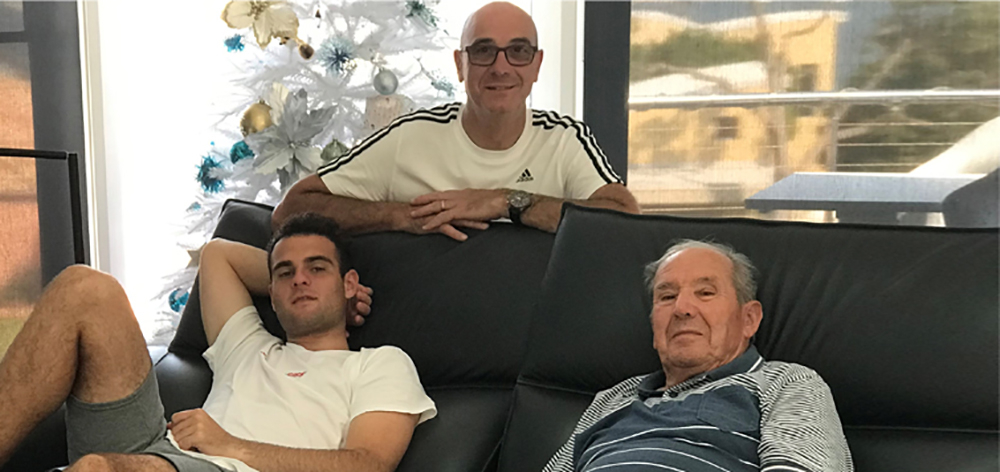13 Oct 2022

HEIDI DOUGLASS | h.douglass@unsw.edu.au & HELENA HUDSON | h.hudson@unsw.edu.au
Head of Middle Markets Distribution and Sales at iPartners, Vito Abbonizio supports CHeBA’s call for dementia care to be seen as a human right, and for improved reform across government and aged care policy.
Italian born Raffaele Abbonizio is 87 years of age and effectively bed bound, a disheartening picture for Vito who describes his Dad as a personable, talkative tradesman.
Over the course of a year, his cognition declined so rapidly that he lost the ability to speak, walk, feed and take care of himself.
“Dad was diagnosed two years ago with dementia,” says Vito. “Undeniably the biggest challenge has been coping with the speed of onset, and the minefield of organising care, dealing with social security departments, and then eventually admission to aged care in such a short period of time.”
Vito says that the COVID pandemic exposed many national shortcomings in care and the system generally.
“Pressure needs to continue to ensure that the dignity of the person living with dementia, and the families of those individuals, remains paramount.
“We were lucky enough to have Dad in a facility with staff that took great care of the residents, but there were plenty of failings across Australia, and more broadly,” says Vito.
“The other glaring issue is policy change. Government reform is necessary to assist the families who are often required to provide financial assurance during the admission to aged care.
“If a family is forced to sell an asset such as a property, which was the case for my Dad and I, and it can clearly be shown that the proceeds are going to pay forcare, then that sale should not be subject to capital gains tax.
“The additional tax imposed would be far better spent on care for the family member living with dementia, not to mention reducing the financial burden on the provider.”
Vito believes that beyond the anguish of the individual, there is a silent suffering of the families providing significant financial assistance to ensure adequate care for their loved ones.
Looking to the future, Vito suggests that societal reform is required to prepare for the possibility of cognitive decline.
“We all plan in our Wills for death, but not what needs to be done if we become incapacitated by an illness such as Alzheimer’s.”
“My Dad’s decline was so fast we didn’t even have time to properly discuss how he felt."
Now, I miss our conversations. My biggest challenge personally is not being able to communicate with Dad or interact with him physically anymore.
Vito Abbonizio
“It’s very much a one-way conversation, which is difficult to cope with in any relationship,” says Vito.
Vito and Raffaele stay connected primarily by virtual means.
“Travelling to visit Dad is challenging, and although we are no longer able to have a natural conversation, I still stay in regular contact and always try to inform him of how the family is doing and provide updates about my wife and son.
Additionally, both of my wife’s parents are in South Australian aged care due to dementia and attempting to manage both sides across two different states has been very challenging.
“I feel the tide is swelling in relation to dementia awareness, with more people like myself and my son seeing parents and grandparents being affected by this condition."
Vito lost his Mum to breast cancer many years ago at just 58 years of age and recognises that advances in medical research have saved so many lives in the next generation, including his wife’s.
“My wife was diagnosed with cancer last year, and thanks to research outcomes and new treatment programs we are confident she will continue to get better."
Vito believes that the same success will eventually be seen in dementia research, thanks to groups like the Centre for Healthy Brain Ageing (CHeBA) focusing their attention on the disease process as well as healthy brain ageing.
“Anyone that is subjected to any illness like this seeks eradication of the disease or a definitive solution."
“However, like most things that have an unknown origin or that are complex to trace, it is going to take time, effort and funds to work to this common end goal."
“Ultimately, continued awareness, discussion and research will drive and accelerate the finding of a solution to this illness, and provide much needed comfort to the families of 55 million globally that are diagnosed with this horrific disease.”
iPartners is the major sponsor of The Dementia Momentum anniversary hosted by KPMG Sydney.
Dementia is vastly under-funded, relative to cancer and heart disease, even though the disability caused by dementia in the older population is much greater.
We know that research is the key, and we need a quantum leap in investment to meet these challenges.
CHeBA is perfectly placed to meet the challenge.


